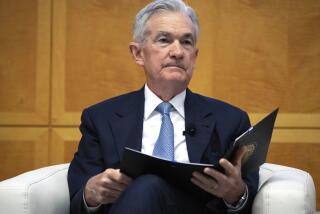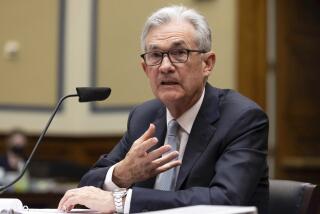European Central Bank Expected to Hold Line at 2% Interest Rate
- Share via
The European Central Bank probably will keep its benchmark interest rate at 2% for a 13th month to give the economy of the dozen euro nations time to pick up pace, economists surveyed by Bloomberg News said.
The euro economy grew an export-led 0.6% in the first quarter. While that’s the fastest pace in three years, it contrasts with 1% achieved in the U.S. and 1.5% in Japan. Increasing sales abroad have yet to prompt companies to hire, damping consumer confidence.
“Europe’s recovery continues to be contingent on events elsewhere,” said Adam Chester, chief economist of HBOS Treasury Services in London. “There’s cautious optimism that the improvement in the U.S. is now coming over to Europe.”
Central bankers including U.S. Federal Reserve Chairman Alan Greenspan, ECB President Jean-Claude Trichet and Bank of Japan Governor Toshihiko Fukui are meeting in Basel, Switzerland, to gauge the prospect for higher interest rates.
The Fed is expected to lift its overnight lending rate by a quarter point Wednesday to 1.25%, according to the median forecast of 133 economists surveyed by Bloomberg News. That would be the first increase since March 2000. The Swiss National Bank and the Czech central bank this month unexpectedly increased rates for the first time in four and three years respectively.
The ECB will probably wait until the first quarter next year before raising its benchmark rate by a quarter point, the median forecast of 34 economists surveyed showed. The ECB’s benchmark rate is currently at the lowest in almost six decades.
The ECB expects growth in the dozen euro nations to gather pace in the course of this year. At the start of the month, it said the region’s economy would grow about 1.7% this year and 2.2% next, after expanding 0.4% in 2003, the slowest pace in a decade.
France, the euro region’s second-largest economy, has grown twice as fast as Germany and Italy in the first three months, expanding 0.8%.
Consumer confidence probably rose for the third month in four and manufacturers’ grew more optimistic in June as global growth boosted exports, easing unemployment concerns, and gasoline prices retreated, separate surveys by Bloomberg News indicated reports this week may show.
European manufacturing probably grew for a 10th month in June. An index based on a survey of about 3,000 purchasing managers compiled by NTC Research Ltd. for Reuters Group may have risen to 54.9 from 54.7 in June, a separate survey showed.
ECB policymakers are focusing on accelerating inflation, rather than the risk of the recovery faltering.
The 31% increase in oil prices in the last year pushed inflation to 2.5% in May, the highest in more than two years. That raised concern at the ECB that the increase may lead to higher wage demands, pushing the inflation rate higher still
“If oil prices were to remain at their recent high levels, it is to be expected that inflation rates would continue to be higher than previously anticipated,” the bank said in its monthly report on June 10. “The potential risk of second-round effects via wages needs to be monitored closely.”
Investors increasingly expect higher borrowing costs in Europe, futures trading suggests.
A 10% drop in Brent crude oil futures, the benchmark for two-thirds of the world’s oil, since reaching a 14-year high of $39.12 on the International Petroleum Exchange in London on June 1 has eased the concerns. ECB council member Gertrude Tumpel-Gugerell last week welcomed a “normalization” in oil prices.
The inflation rate is seen falling to 2.4% this month, according to the median forecast of 35 economists. The ECB aims to keep the rate just under 2%.
More to Read
Inside the business of entertainment
The Wide Shot brings you news, analysis and insights on everything from streaming wars to production — and what it all means for the future.
You may occasionally receive promotional content from the Los Angeles Times.










